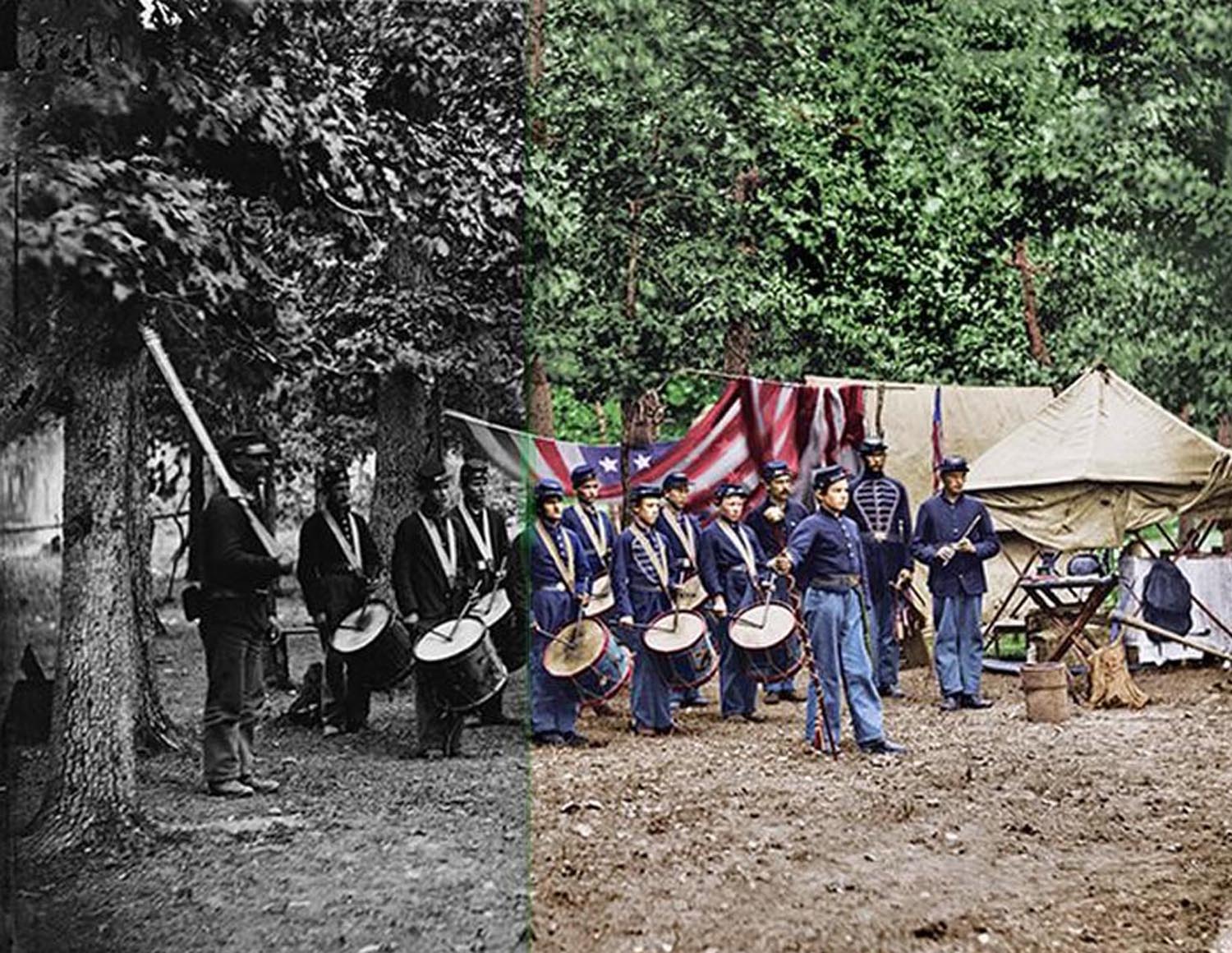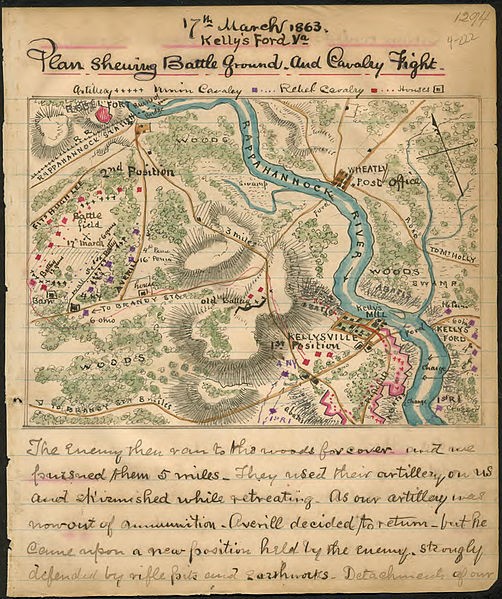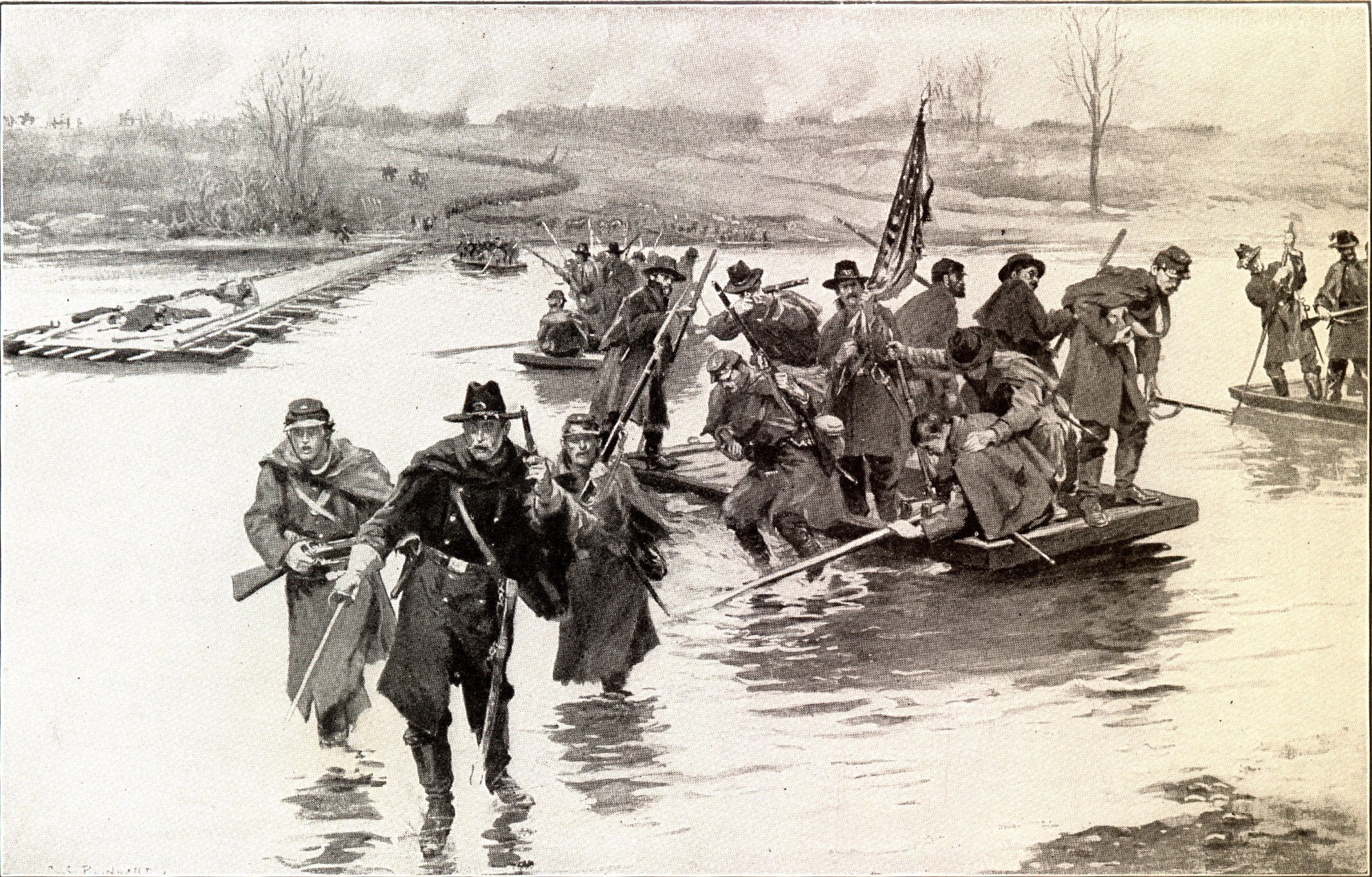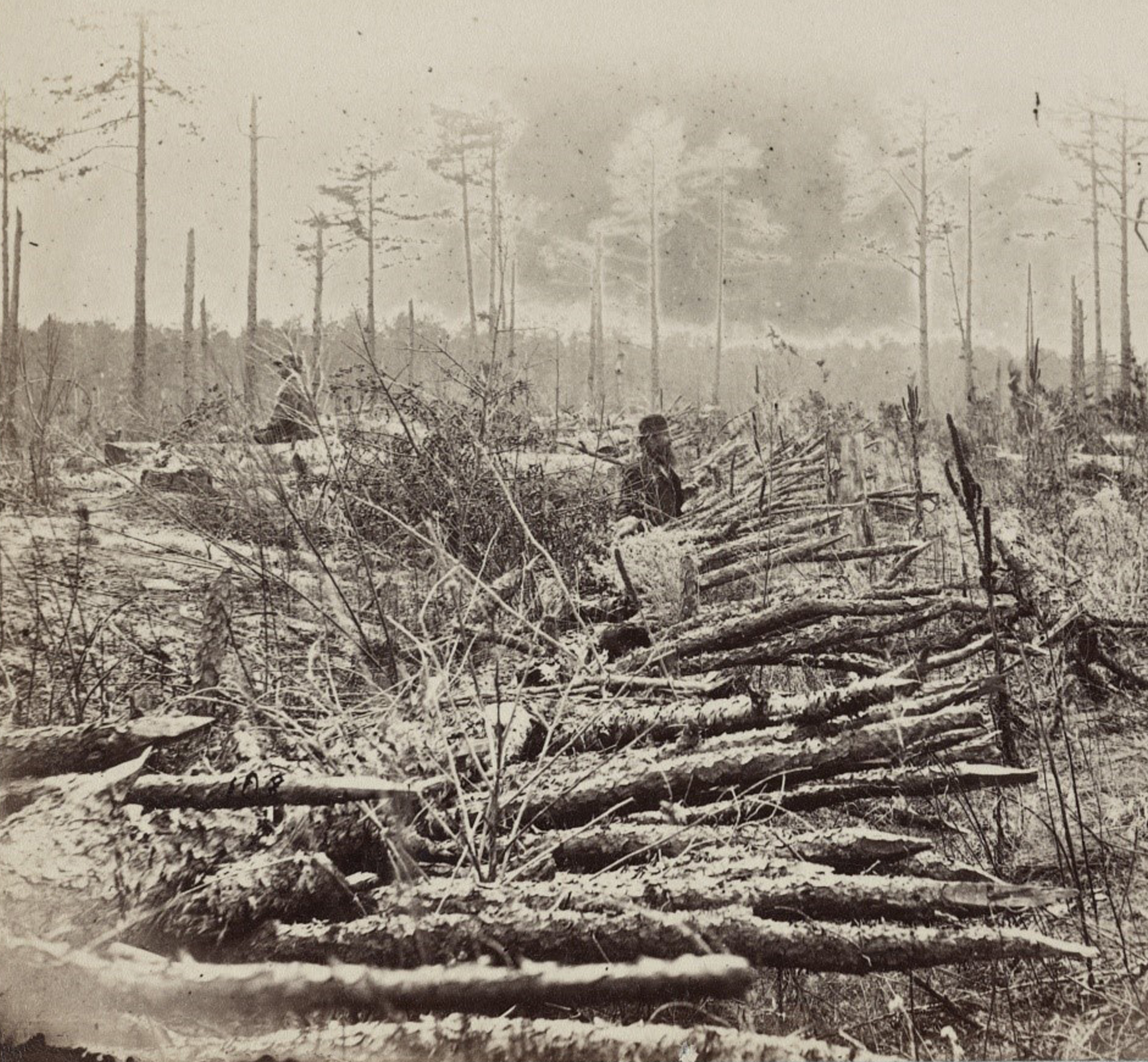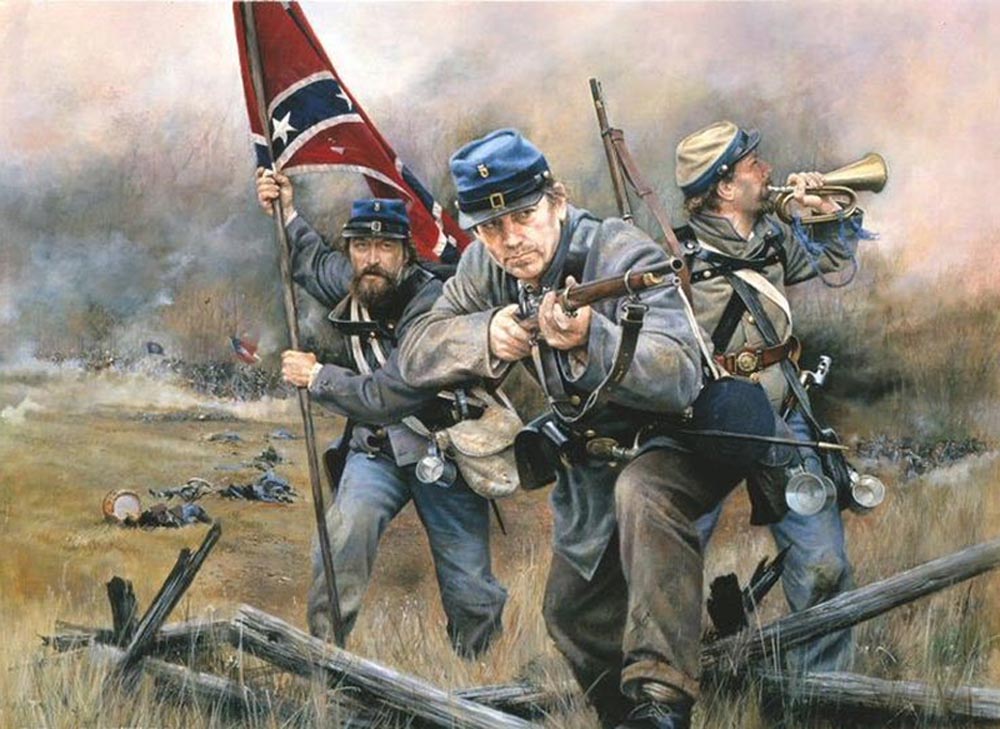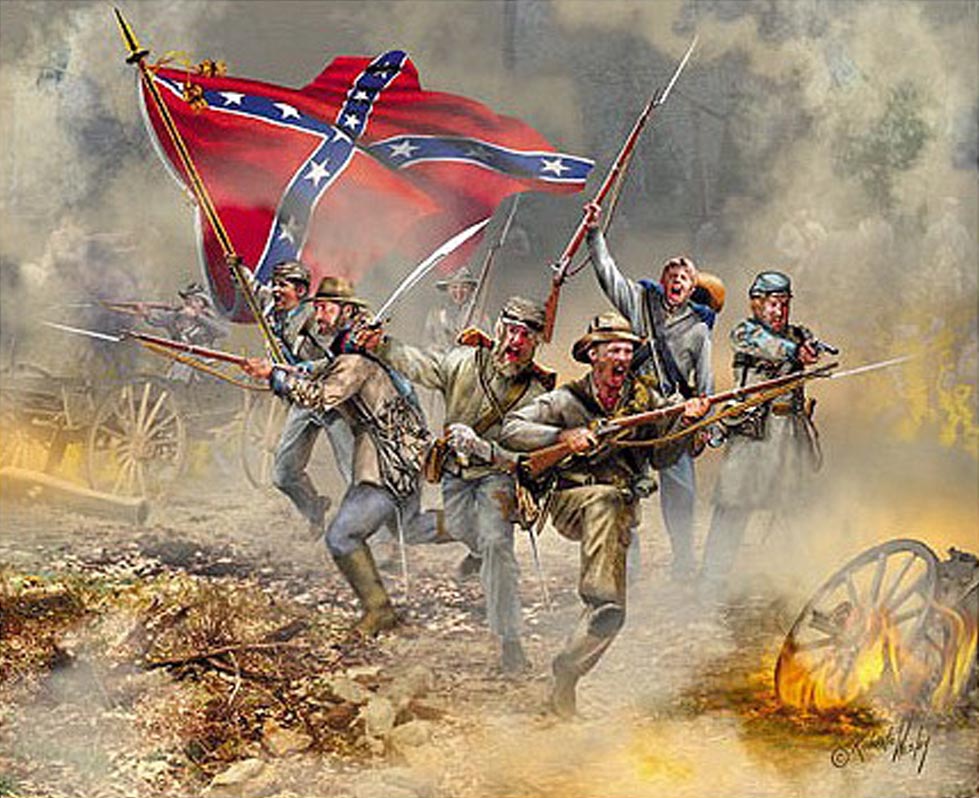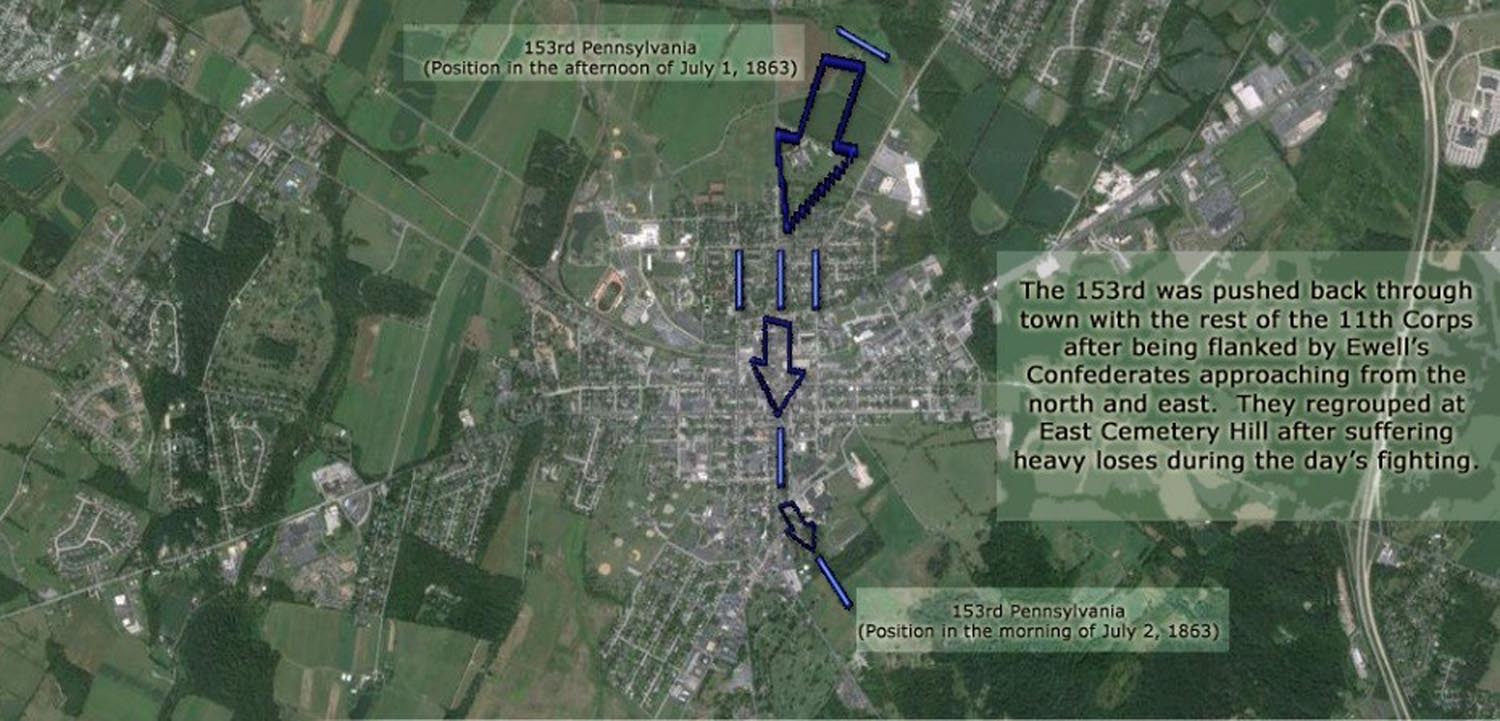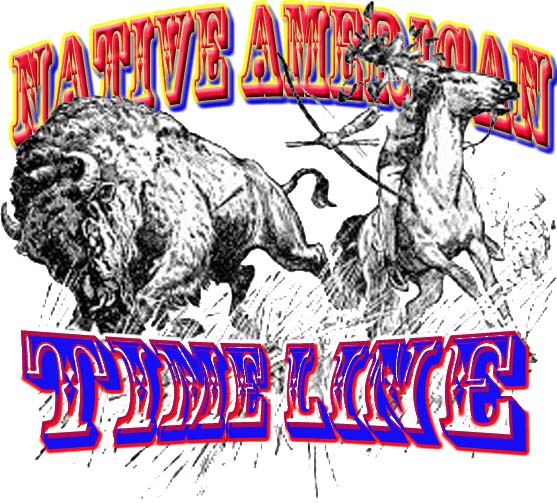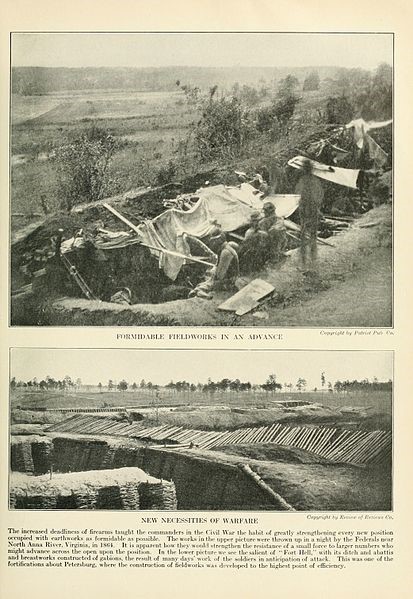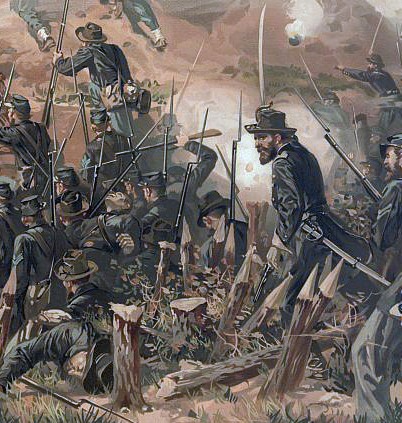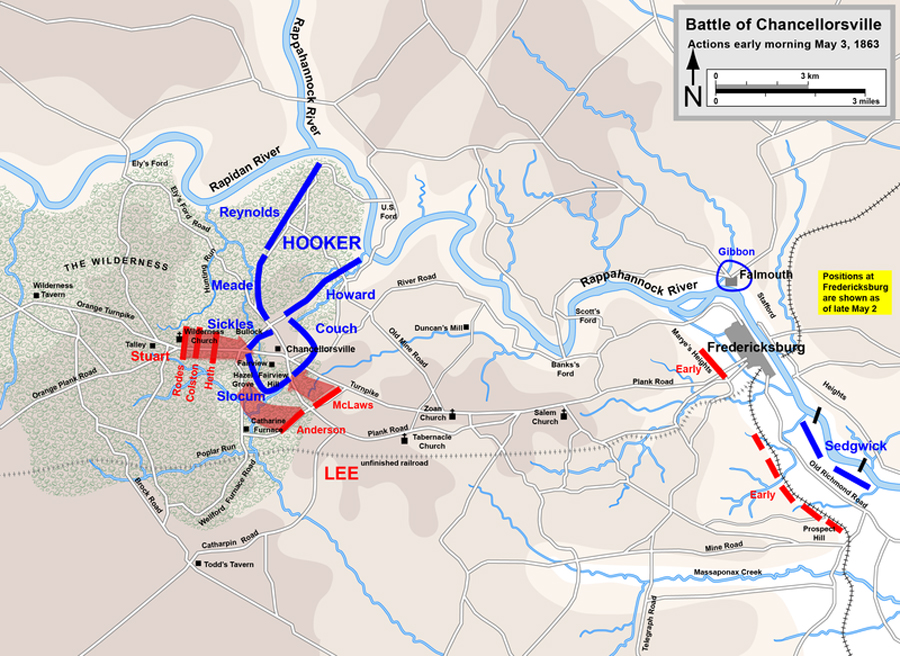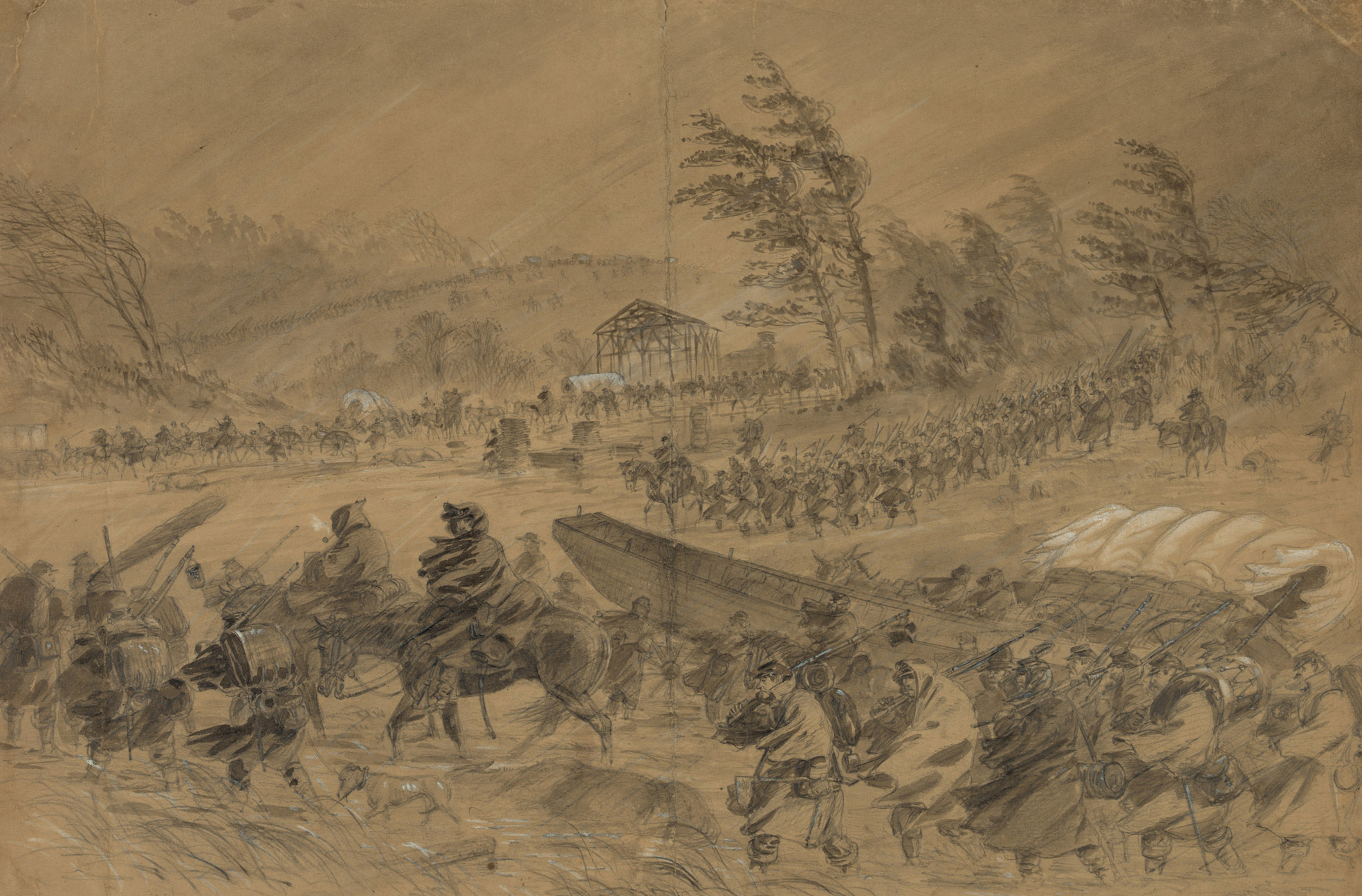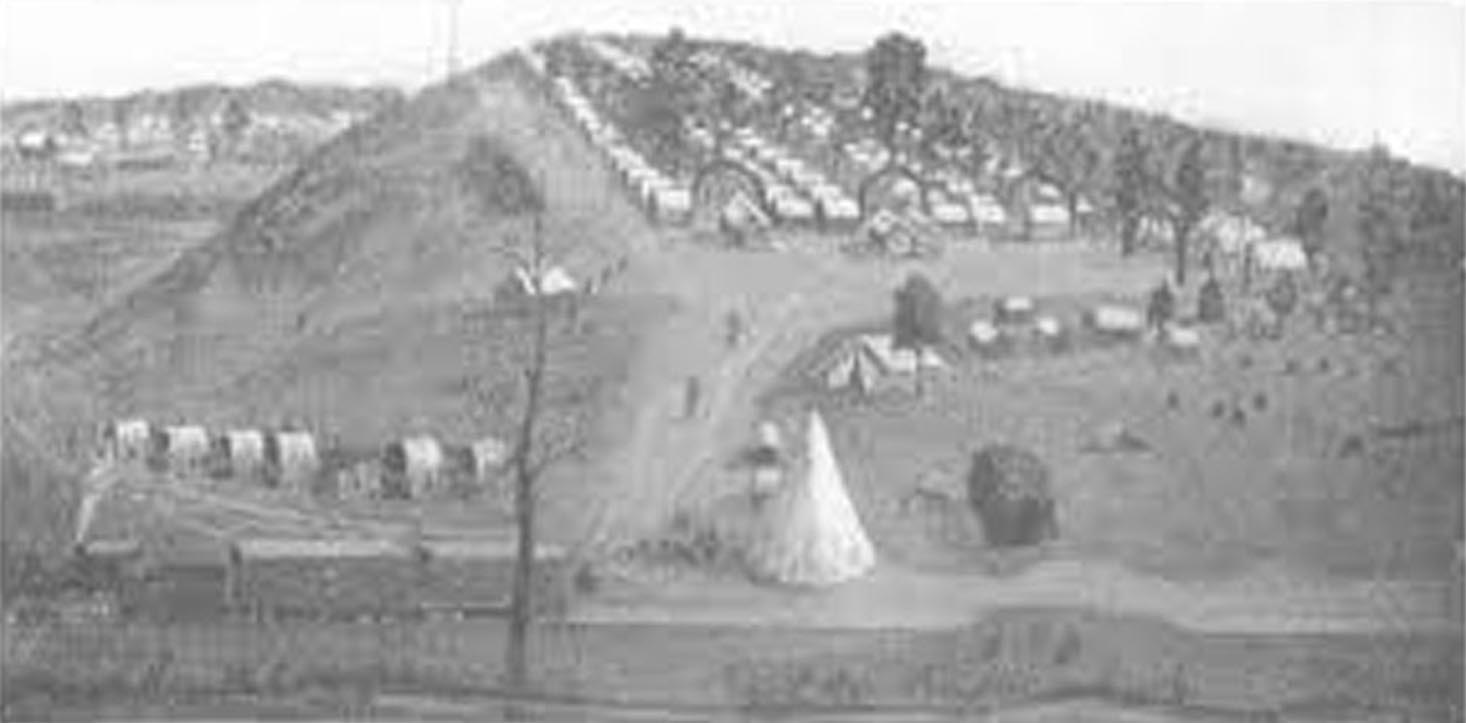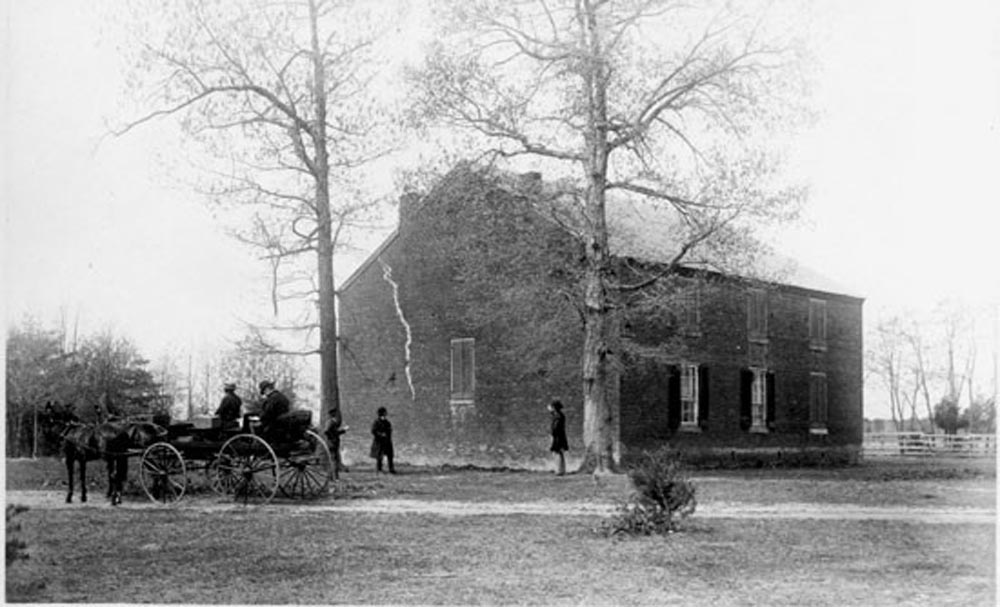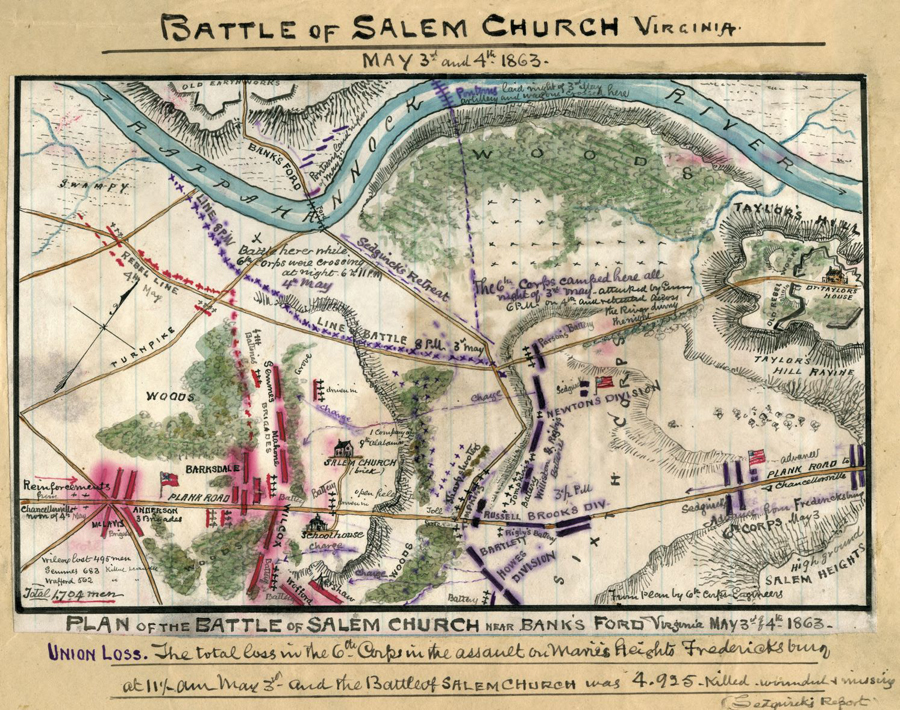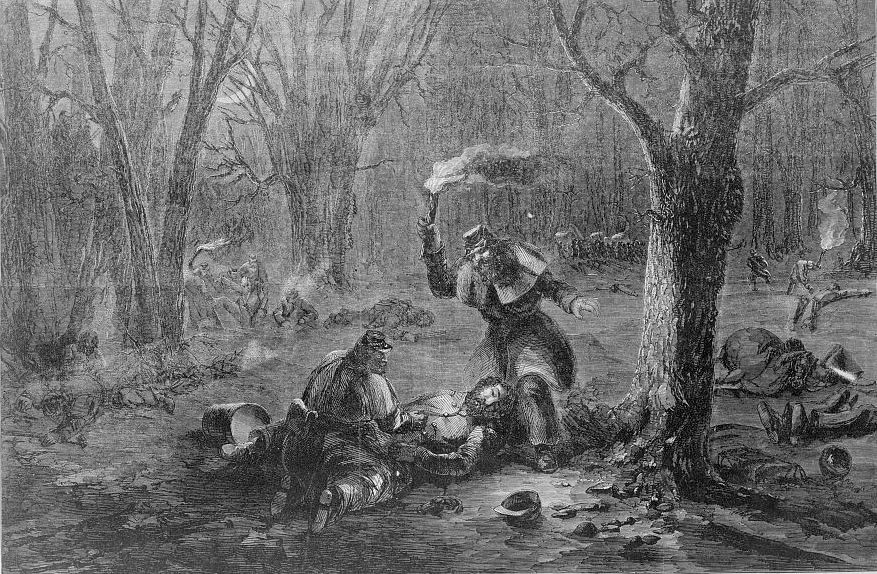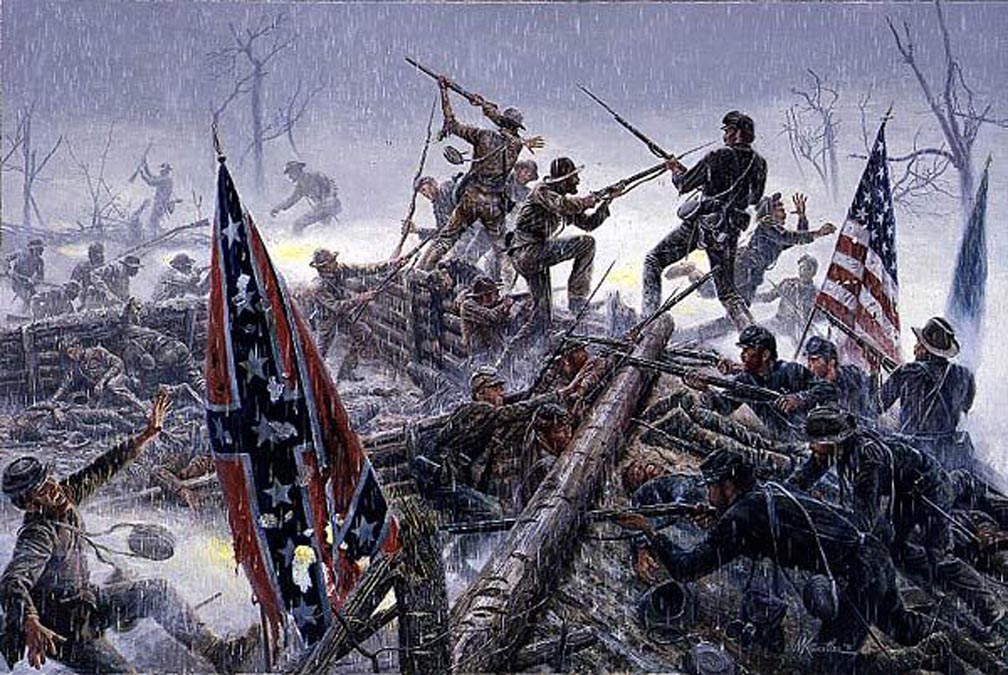Military marching band
The bands played, the men shouted, threw their hats in the air, and became the boys who would have the honor of accomplishing what had long been the motto: “On to Richmond.”
But Hooker had overlooked the fact that he had to deal with Stonewall Jackson. Again, they were reminded of the solemn fact that “It is appointed unto all men once to die.”
The 153rd with the other regiments of the Eleventh Corps broke camp and marched to the neighborhood of Hartwood Church. After a short night’s rest, they moved on to Kelley’s Ford, arriving there in the afternoon. On this second day of the march, which all old soldiers know is the most trying, the regiment did well.
Timeline 1800 – 1842
Kelly’s Ford battle plan map
The stragglers formed a tiny number of those brought up in the rear by the provost guard. On the same evening at eleven o’clock, the camp was broken. In silence, the Corps was the first to cross the pontoons and penetrate the darkness and swamps of the southern side of the Rappahannock.
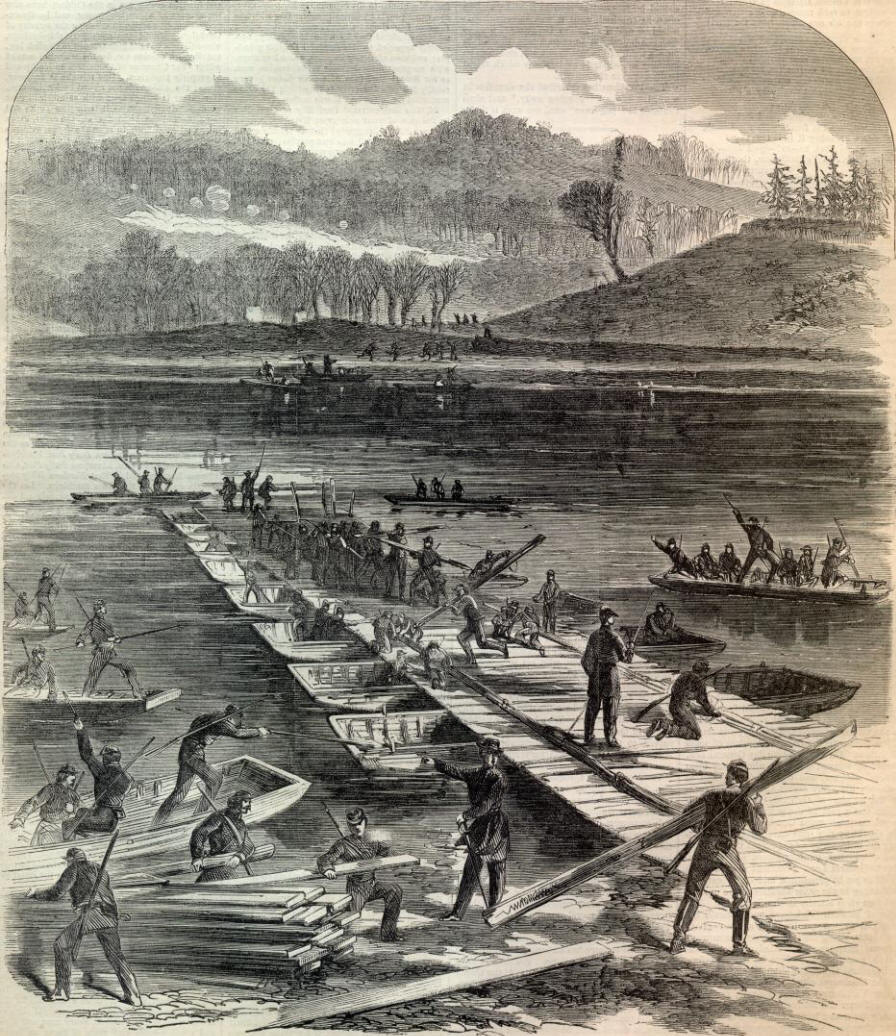
Building Rappahannock bridge
After David had crossed on the pontoon, the men marched up a high hill. Looking back, he had a view of most of the army, and a grand sight it was. It was approaching in three columns, each headed for one of the three pontoon bridges. The serpentine movements of the troops with their flying flags were a beautiful sight.
A grand sight it was
Again, in the night between one and four, the Corps crossed upon a narrow and dangerous bridge in heavy rain. Immediately, all the men expected an attack, having had their rear harassed by some of the rebel artillery during the day, but they crossed unimpeded. They advanced along the plank road to its junction with the turnpike at Peck’s farm, about two miles west of Chancellorsville. That night, full rest was given.
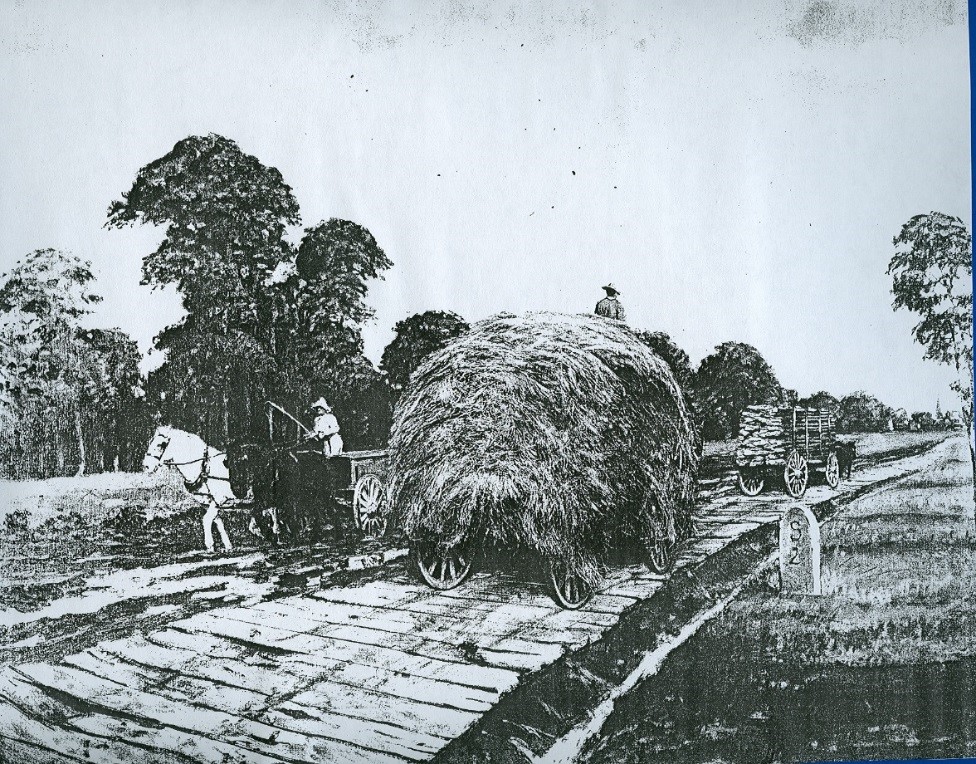
A plank road
Just before going to sleep, David took the scarf-bound books out of his haversack and made an entry into his diary.
No date:
Somebody in my camp had liquor, at least our captain’s little French cook seemed to have had too much. During the night, he accidentally discharged a rifle in his tent. The captain was very much frightened, and greatly excited, called the company to ranks. He wanted to know who attempted to shoot him, and under great stress of alarmed feelings demanded to know. We were finally dismissed and returned to our tents, but not to sleep much that night.
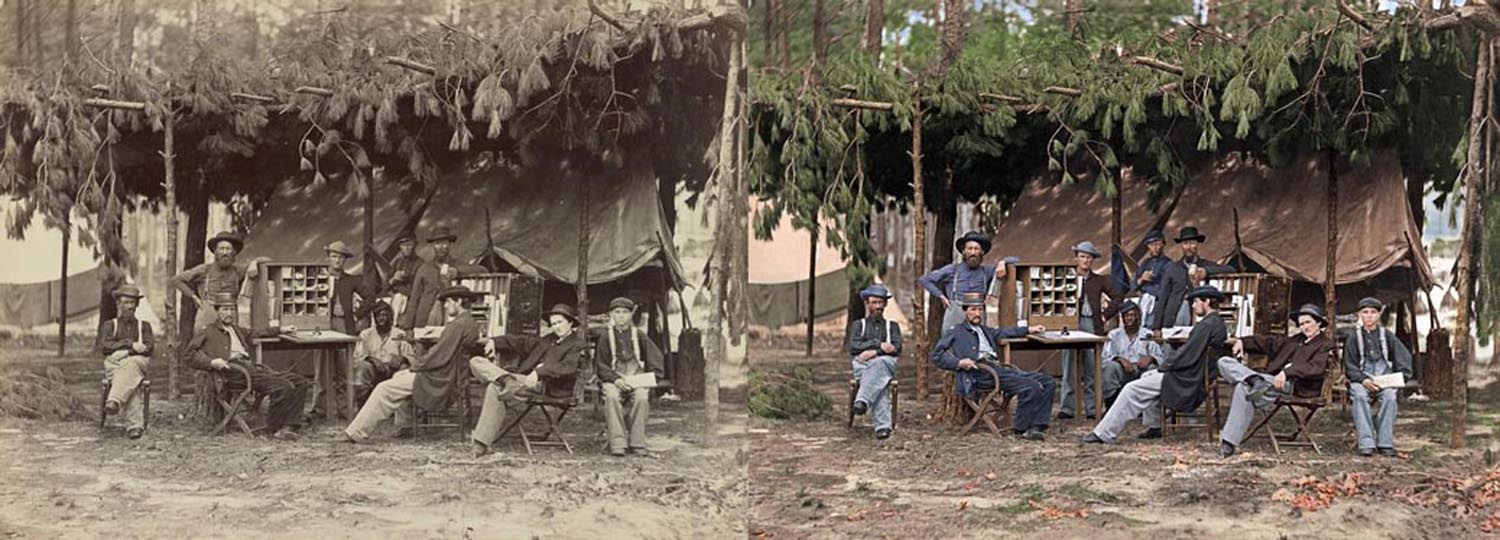
Camp life
On Friday, General Howard made the disposition of the Corps in three lines of battle. Through the woods and across a road leading into the turnpike stood the 153rd Pennsylvania Volunteer Infantry. The General used them more like a close line of skirmishers than a regular line of battle. They were ordered to stand three feet apart. They were still in this position on Saturday at noon, supporting a section of artillery commanding the road.
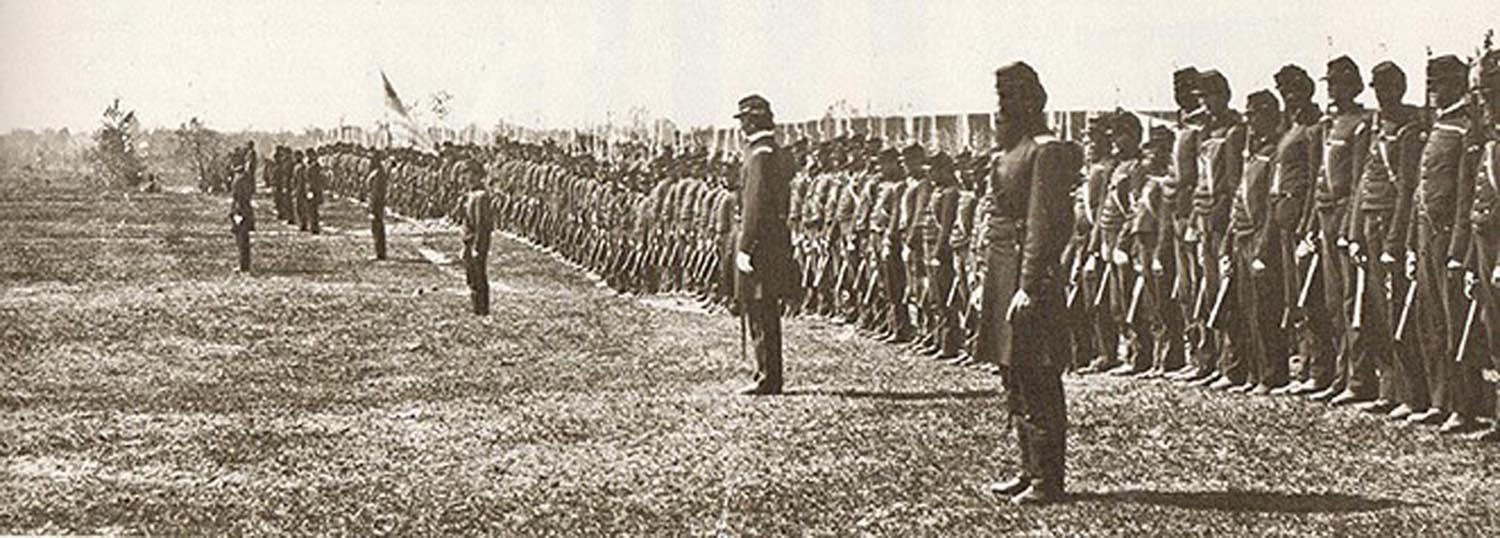
The skirmish line of battle
David assisted in the slashing of the trees to make a barricade in front of the regiment on the Chancellorsville battleground. General von Gilsa was present and told the men how to cut the timber, but when a falling tree hit him, he told the men, “Quit, that’s enough.”
Cutting down the trees to make a barricade
A runner brought information that an attack was expected on the right flank. Skirmishers were thrown forward into the woods, and, at about five o’clock in the afternoon, they reported the rebels were amassing and approaching.
Advancing across open ground
Hardly had the information been brought in, and the line called into readiness when the tooting of numerous small bugles was heard, and the whizzing of balls began. The explosion of shells, over and alongside everybody, clearly demonstrated that the rebels were in force. A fact which the thirty-five cavalrymen on patrol had not been able to discover.
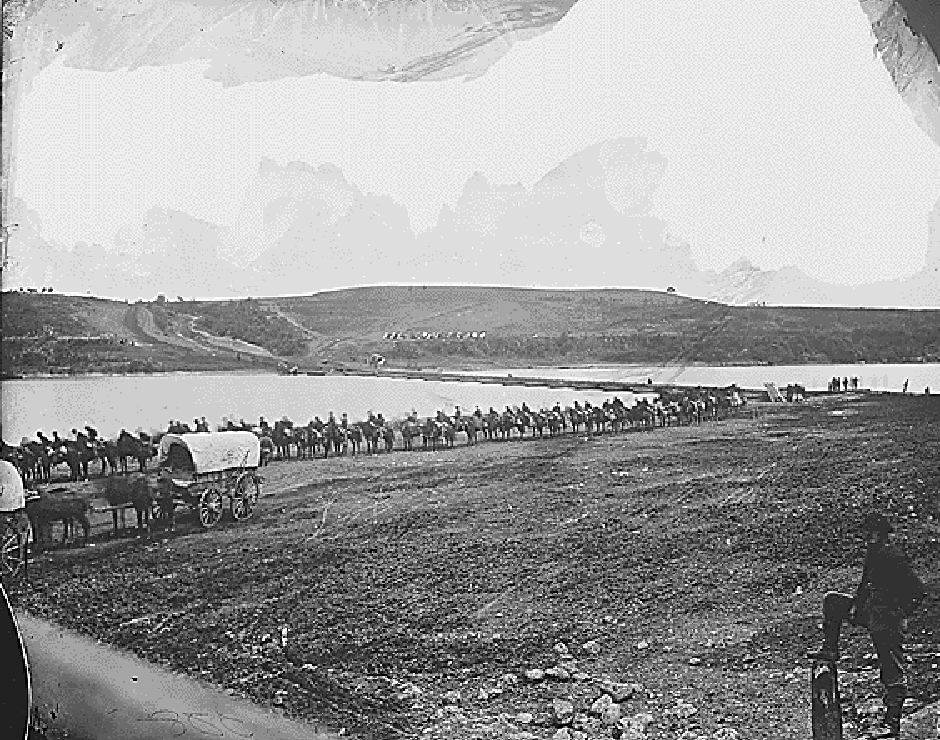
Cavalry at the Rappahannock
The rebels advanced, close-in mass with their whole force. The attack was a concentrated volley of gunfire directed along their line of the brush barricade from end to end. And the Rebels were rushing over the cleared space where the trees had been cut down. At the opening of the battle at Chancellorsville, John Ribble was the first man wounded. David stood in line next to him and saw him fall. He never moved again. The dead man was removed in a wagon and taken to the rear.
The Rebel Yell
Sometime later, David made an entry into his diary.
No date:
I was on the picket line when the rebels came rushing upon us through the woods yelling like fiends. At the command of the officer in charge, I fell back into line, and soon the command to fire was given. My comrades dropped by my side. Soon the retreat commenced, one of the provost Marshalls trying to rally the cattered forces, struck at me with his saber, hitting my rifle, cut a deep gash into the barrel, by which I knew it ever after.
After the first volley, the Forty-fifth New York, accompanied by two artillery pieces, sought refuge in a very rapid change of base. And soon after, the Fifty-fourth New York also retired. After both supports had withdrawn in mass, the 153rd Pennsylvania Volunteers still stood. And as a regiment, they gave a parting volley to the enemy, which the rebel prisoners reported to have fearfully mowed down the ranks of the advancing First Virginia Brigade.
153rd as they retreated through town towards Cemetery Hill
Then the order to retreat was given, and the 153rd indeed withdrew to have men left to fight again. It was a moment of great excitement. As David retired from the Rebel advance, he saw the stacked guns of the 41st Regiment, but all the men were gone. He took a gun from the stack and fired. He found out the regiment behind the 153rd had retreated and left their weapons. Those troops were supposed to be guarding the rear. At a military hearing held after the battle, Comrade Rhoads testified that when he retired from the Rebel flank at Chancellorsville, he saw the stacked guns of the 41st Regiment and the men gone.
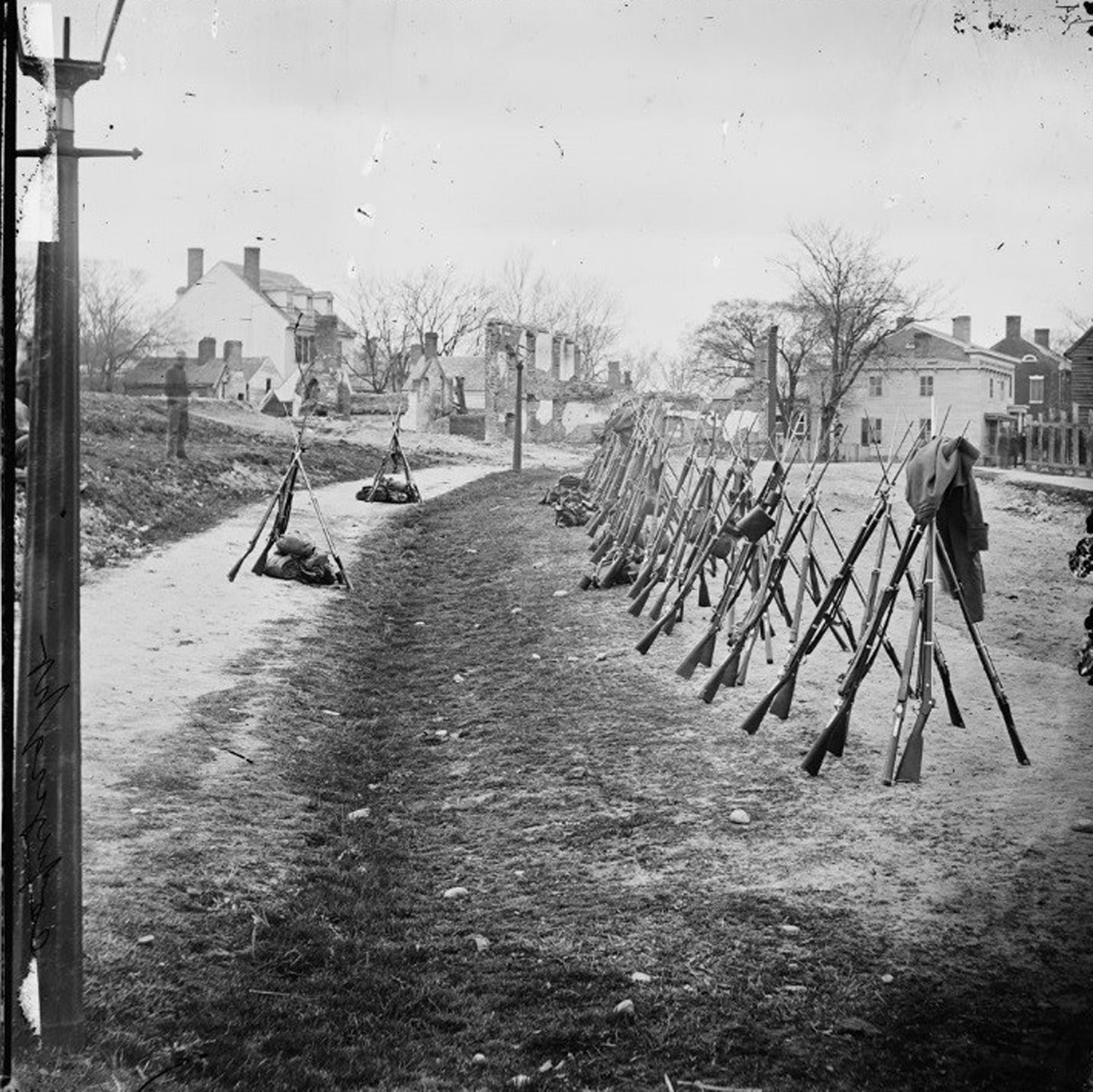
Stacked guns
Several vain attempts were made to rally the retiring forces of the Eleventh Corps. Still, they were preceded on the retreat by the brigades and divisions trying to get as far away from the enemy as they could. It was impossible to find cover from the Rebel sharpshooters.
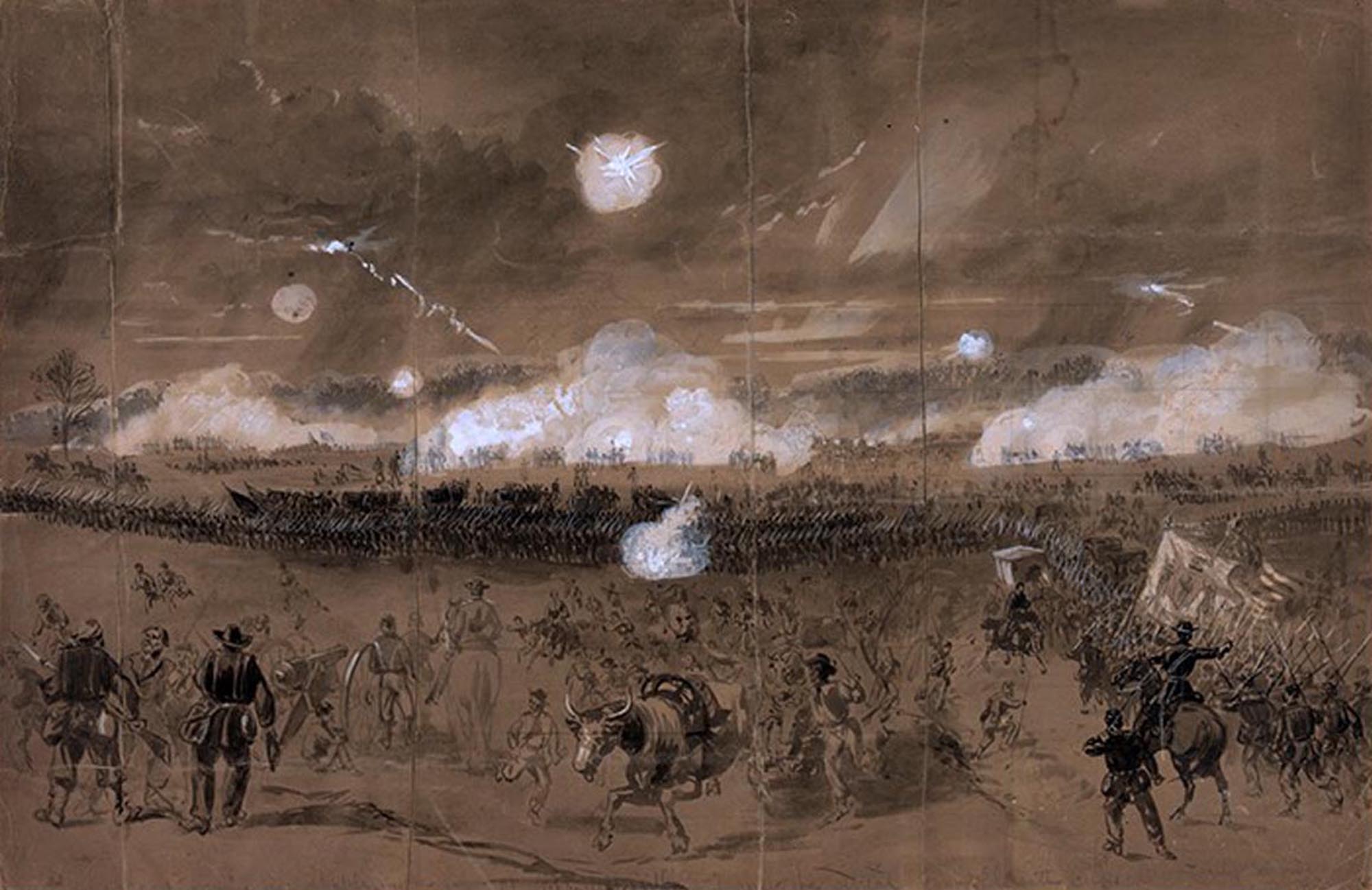
Eleventh Corps disgracefully running away, May 1–3, 1863
After the main body of soldiers had gone back about a hundred yards, David saw Captain Howard Reeder of Company G standing not ten feet away. He was deliberately discharging his revolver into the ranks of the onrushing Rebels. He then turned and ran.
David wondered to himself, “How he ever got away without being killed was a miracle,” as the Rebels could not have been more than 15 feet from him.
This was indeed the type of leader that orders his men, not “Go forward here and there,” but “Come along with me, boys.”
Native American Tribes & Peoples – part 1
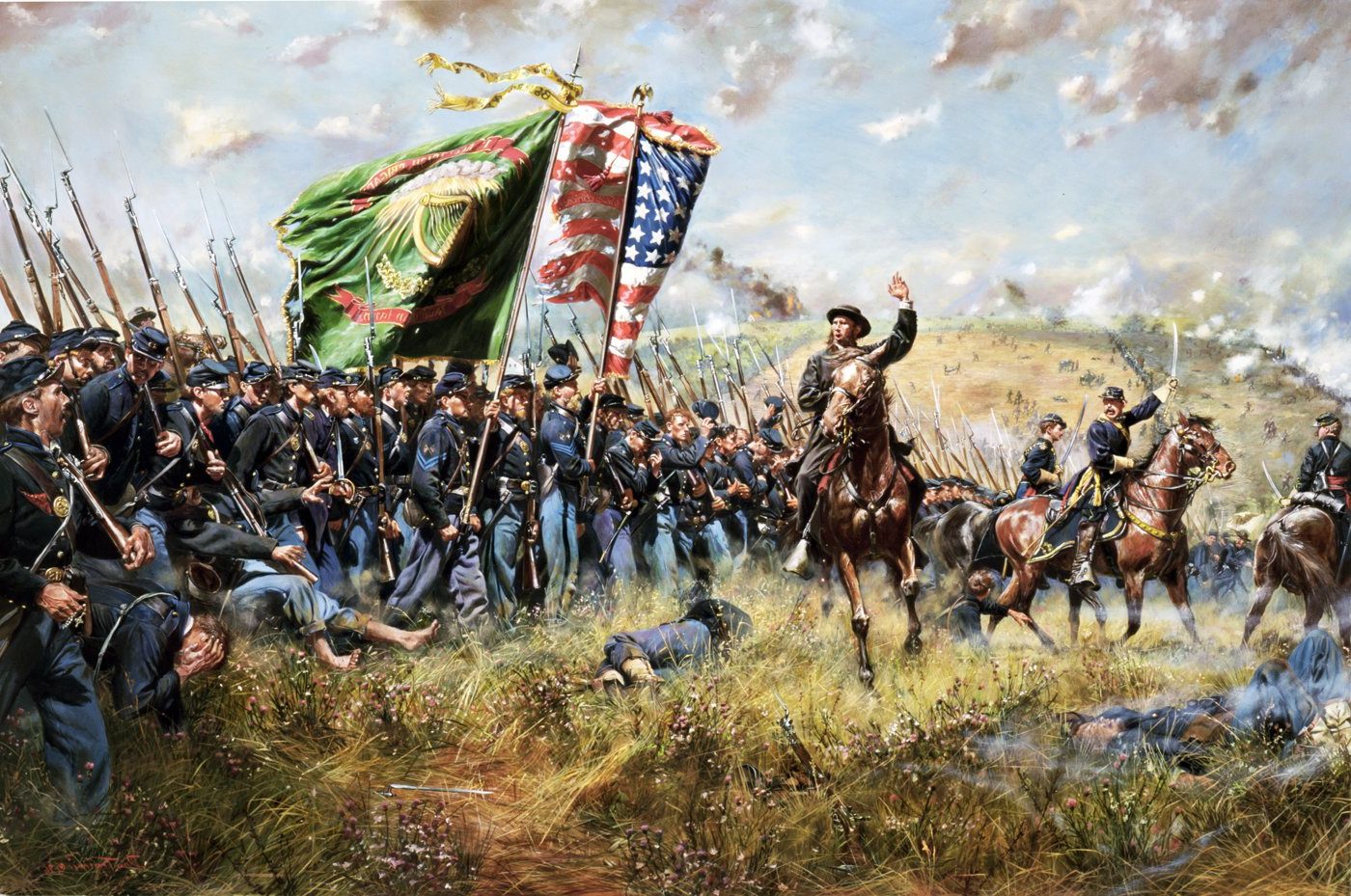
“Come along with me boys”
Comrade Benner’s regiment occupied a position on the right-wing, facing the Southern Army under General Jackson. At the beginning of the engagement, the regiment had been ordered to lie down on their stomachs. And to shoot and roll over on their backs to load guns, thereby escaping the rebel balls. While in the act of loading his rifle, a cartridge became jammed in the barrel. Comrade Benner arose to his feet to force the round into place. While doing so, a Rebel soldier about ten paces in front of him took deliberate aim and fired, wounding him in the right shoulder, bringing Comrade Benner to his knees. But he bravely returned fire on the Rebel soldiers four times. The regiment was ordered to retire before Jackson’s attack.
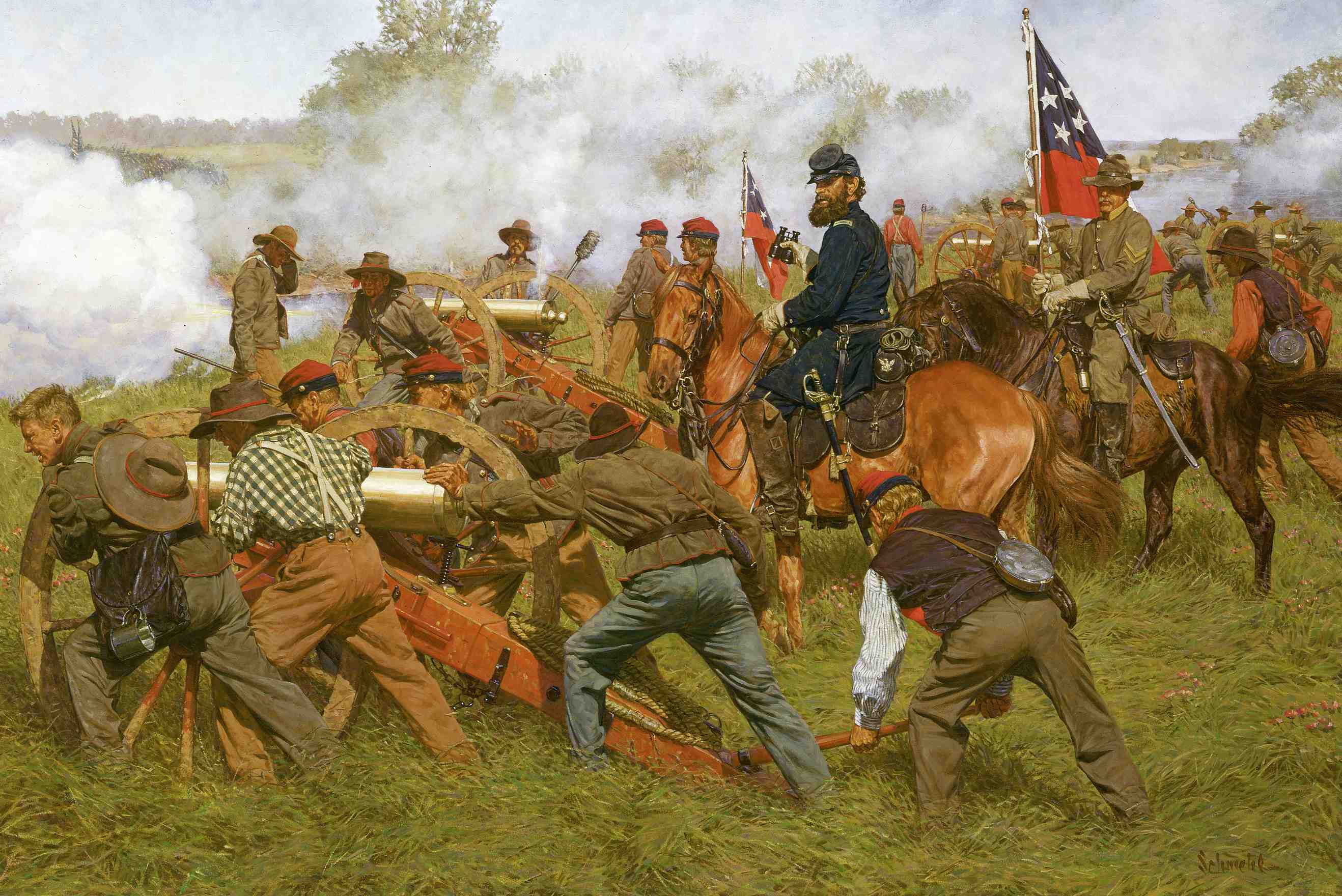
Jackson and his disciples
While retreating, Comrade Benner met an ambulance, which took him to the field hospital. Here he remained all night. The next morning the order came for all the wounded who could hurry across the Rappahannock at United States Ford. The hospital was in line with the ammunition train, which the Rebels were shelling.
Rifle pits
The Rebel army commenced throwing shells across the river towards the signal station and ammunition train. And again, the order came for all the wounded soldiers that could run. Fifteen of the wounded soldiers, including Comrade Benner, were loaded into an army wagon and taken to Stoneman’s Switch. There they were loaded into a cattle car and taken to Aquia (ah-qui-a) Creek Hospital. After coming home, Comrade Benner’s wound worsened, and he could not return to the front. He was finally mustered out with his regiment on July 24, 1863, at Easton, Pa. As soon as any, the 153rd Pennsylvania Volunteers was rallied and spent the greater part of the night digging rifle pits. Then, just before going to sleep, David wrote by candlelight in the little book of his life. He tucked the diary away in his Bible and wrapped them up in the scarf, and along with his haversack, made himself a pillow. He fell asleep with his head resting on what he had just written.
No date:
There was a time today when the cannon fire was so fierce that every living thing tried to leave the thicket all at once. I watched as our lines began to break and fall back. The instinct of survival took over, and I began to run. I saw a wounded man struggle to get to his feet, and as he fell back with his last breath, he waved me back and gasped, “save yourself, boy.” I ran through a cloud of dust, smoke, and blood, hardly breathing from sheer terror. Shortly after making it to the safety of our battery lined up along the hill, a call came out throughout the camp for volunteers to be runners. I was informed that my name had already been put on the list by an officer that saw me running from the cannon fire earlier. I was sent along with the men who stepped forward to the hospital tent to have a quick examination to make sure we were fit for duty as runners. Out of twenty-two applicants, but three passed the examination, and I was one of them.
“Save yourself boy”
David was detailed as a courier on the staff of General von Gilsa. The 153rd Regiment was a favorite with the general, and David was often associated with it. The general had also detailed several other men to be runners and selected them from the 153rd.
Joseph Hooker and the Battle of Chancellorsville
On Sunday morning, David moved with the company again into the front line of entrenchments. They stood opposite the center of General Hooker’s line of battle. They remained there until Wednesday morning when the Corps covered the withdrawal of his army to the other side.
The mud march nor’easter
On Wednesday, amidst terrible rain and the natural condition of Virginia mud, the exhausted men returned to the former camp near Brooks Station. They spent the night recuperating their weary bodies. David was awakened long before dawn. He was summoned by an officer whose lantern was dimmed so low that David could not see who it was. Quickly, he found himself on his first mission as a courier, comfortably seated in a carriage, with a driver whom David had seen before, taking many parties over the ground.
153rd camp at Brooks station
The carriage proceeded by way of the Plank Road towards Chancellorsville, stopping at the Salem Church. This would shortly be the scene of a desperate fight that prevented the Sixth Corps from joining the main Army of the Potomac at Chancellorsville.
The Salem church
The Command chose this place for officers and couriers to meet face to face to better recognize the line of communication in battle. The meeting was over almost before it started because shelling was heard in the distance. David was returned to the exact spot where he had been sleeping, and in the morning, none of the other men knew he had ever left.
Battle of Salem Church 1863
When death is a daily reality, promotion comes quickly on the battlefield. About the time they left Brooks Station, David was appointed Acting Assistant to General Howard. His horsemanship and ability as a marksman were well-known, and he was a favorite among his men. David had proven himself earlier as a runner of great speed and agility. He was promoted to Corporal and given a document of free passage to permit his traveling as a courier. In David’s capacity as an aide, he had unlimited opportunities by day and night of seeing every one of the regiments in this division. At all times and under all circumstances, he found both the officers and men of the regiment in the best of spirits. No regiment in the Corps went more gladly to battle or more cheerfully submitted to privations.
One night, David was called upon to be an envoy to Major Freuhauff (fru-hoff), who had been wounded. His men helped David bring the major across the Rappahannock River while retreating from the field. They crossed under the cover of darkness. They had only gone a short distance on the other side when the horses refused to go any further. David had traveled down wooden plank roads before riding on the same horse. They were very bumpy, you had to go slow, but the horses never had a problem before.
Recovering the wounded in the dark
As quietly as they could, the men forced the horses forward. Then one of the men, using very poor judgment, tried to light his pipe. The campfires of the enemy were burning all around them. In the flash of the match, the men could see they had been traveling on the bodies of the dead. The man immediately threw away his torch and used his spurs to get his horse into a full gallop. Each man got out of there the best way he could in the dark.
No one ever talked about what had happened, not even to each other. The men arrived at the hospital early in the morning but found everything full. The major suggested that the men lie down on the ground. No sooner had they touched the ground than they all fell asleep, totally worn out.
No date:
About 7 or 8 o’clock, I felt the point of the major’s elbow in my side, when he said, “look here.” I looked, and the army was passing by, banners flying and the troops in full retreat for Falmouth and the old campgrounds.
The Confederate command became aware of weak points in the Union Army, and they made a circuit that completely enveloped their line. David later wrote about it.
No date:
I am an expert runner when I’m scared, and I was not long deciding what disposition to make of my ‘worldly goods,’ rifle and ammo pack, but to leave them behind and made my way through the dense thickets, escaping with my life.
There was but one point of the compass which suggested personal safety – and that was due North. The next day was Sunday. David continued to use his athletic abilities until he reached the Rappahannock River. Here he stopped long enough to take account of stock and investigate the surroundings. He finally concluded to go back and see how many of the boys of Company D could be found. David followed the line of breastworks of the different regiments and finally came to his men, and they were all glad to see him. He missed a few comrades of the company, and Chunky had the unfortunate job of telling him about personal friends who were killed at the opening of the battle. Among them were two members of the band that Chunky played in.
Bravely battling for all they hold dear at home
On Monday morning, they had a very lively brush with a line of rebel skirmishers on an opposite hill. David felt proud to see the coolness, determination, and spirit animating those Northampton County boys. Major J.F. Frueauff, commanding the 153rd Pennsylvania Volunteers, had his point of view published in all the newspapers of Northampton County.
No date:
At such times to particularize would be improper; suffice it to say that “no officer was shot by a private, and no private cut down by an officer.” Those who have fallen—and, alas! We mourn a number of such—have fallen in the noble discharge of their duties, slain by the hands of traitors; those who have been wounded, have received honorable wounds by the shots of rebels; and those who are prisoners are now in the hands of “our southern brethren,” not in consequence of their own faults, but by the fortunes of war. Hoping this exposition may set to rest all slanders, and assure every true and loyal patriot that he need in nowise be ashamed or should sneer at ‘Colonel Glanz’s regiment of Pennsylvania volunteers,’ and desiring you. For the sake of justice to your fellow-citizens now in the front rank of the army, bravely battling for all they hold dear at home.
>>>Click here <<<
Next: The diary and memories of a Civil War soldier – part 2 – picture book -2
